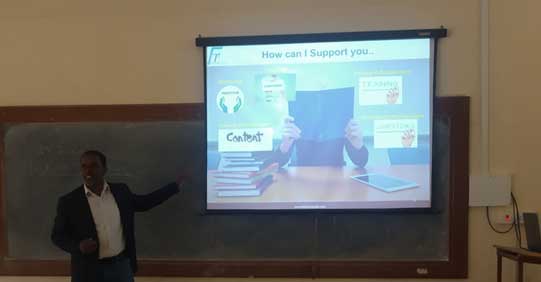Industrial Engineering and Management
Introduction
The Department started in the year 1983 with sanctioned intake of 40 students. The Department is headed by Dr.S.N.Lakshminarasimhan. Total Number of teaching faculties are 5. All the faculties are Doctorates and highly experienced with average teaching experience of 28 years. The staff to student ratio is 1:10.
Vision of the Department
To impart Innovative and value-based education in Industrial Engineering and Management which provides a great learning experience and be a part of an outstanding community.
Mission of the Department
- Inculcate Engineering & Managerial skills cater to sustainability requirements.
- Prepare graduates to excel in the profession and pursue higher education.
- Acquire the technical knowledge, creativity and critical thinking.
- Develop the leadership qualities and ethical values for the betterment of society.
Program Educational Objectives (PEOs)
- PEO-1: The program is designed to become an Industrial Engineering graduate with managerial skills with knowledge of engineering sciences to fulfil the needs of stakeholders.
- PEO-2: The program is designed to create an ambience to pursue higher studies.
- PEO-3: The program is designed to nurture the necessary skills through practical problem solving, teamwork, leadership and decision-making ability.
- PEO-4: To design, develop, implement and improve an integrated system which includes the resources, information and environments.
- PEO-5: To develop a professional attitude with ethics to meet the needs of society.
Program Outcomes (POs)
Engineering Graduates will be able to:
-
- Engineering knowledge: Apply the knowledge of mathematics, science, engineering fundamentals, and an engineering specialization to the solution of complex engineering problems.
- Problem analysis: Identify, formulate, review research literature, and analyze complex engineering problems reaching substantiated conclusions using first principles of mathematics, natural sciences, and engineering sciences.
- Design/development of solutions: Design solutions for complex engineering problems and design system components or processes that meet the specified needs with appropriate consideration for the public health and safety, and the cultural, societal, and environmental considerations.
- Conduct investigations of complex problems: Use research-based knowledge and research methods including design of experiments, analysis and interpretation of data, and synthesis of the information to provide valid conclusions.
- Modern tool usage: Create, select, and apply appropriate techniques, resources, and modern engineering and IT tools including prediction and modeling to complex engineering activities with an understanding of the limitations.
- The engineer and society: Apply reasoning informed by the contextual knowledge to assess societal, health, safety, legal and cultural issues and the consequent responsibilities relevant to the professional engineering practice.
- Environment and sustainability: Understand the impact of the professional engineering solutions in societal and environmental contexts, and demonstrate the knowledge of, and need for sustainable development.
Ethics: Apply ethical principles and commit to professional ethics and responsibilities and norms of the engineering practice.
- Individual and team work: Function effectively as an individual, and as a member or leader in diverse teams, and in multidisciplinary settings.
- Communication: Communicate effectively on complex engineering activities with the engineering community and with society at large, such as, being able to comprehend and write effective reports and design documentation, make effective presentations, and give and receive clear instructions.
- Project management and finance: Demonstrate knowledge and understanding of the engineering and management principles and apply these to one’s own work, as a member and leader in a team, to manage projects and in multidisciplinary environments.
- Life-long learning: Recognize the need for, and have the preparation and ability to engage in independent and life-long learning in the broadest context of technological change.
No members found
| Title | Description | Date | |
|---|---|---|---|
| Visit to The National Institute of Engineering,Mysore | Dr.S.N.Lakshminarasimhan HOD(IEM) and Dr.B.S.Ravikiran visited Centre for research in Robotics and controls,Dept of Mechanical Engineering,The National Institute of Engineering,Mysore on 10-2-2021 | 10-02-2021 | |
| Promotion | Dr.D.Ramesh is promoted as Professor | 06-07-2020 | |
| Talk on Industry 4.0 | Mr Bernard Raja,Director & Founder,Focupath Bangalore gave a talk on Industry4.0 | 27-02-2020 | |
| ISTE convention | Dr.B.S .Ravikiran presented a paper on Education for Industry 4.0 at 49th ISTE Annual National Faculty convention held at Siksha O Anusandhan University, Bhubaneshwar during 29th - 30th November 2019 | 29-11-2019 | |
| V sem IEM students on Industrial tour | As per the curriculum the Department had organised industrial tour for V sem IEM students to JEC Industries tarikere, Varahi underground hydro power plant,Utopia Cashew cluster Hattikeri,Kumta Taluk from 21-10-2019 to 24-10-2019.Dr D Ramesh,Dr.B.S.Ravikiran,Sri M.Chandrashekar accompanied the students | 21-10-2019 | |
| Chief Coordinator IQAC | Dr.R Prakash,Professor assumed the charge as Chief Coordinator IQAC wef 1-7-2019 | 01-07-2019 | |
| Title | Description | Date |




Achievements
- The Department was accredited by NBA.
- The faculty members are in Board of Studies (BOS) in leading Engg colleges.
- Faculties are in the Advisory panel and reviewers in International conferences and Journals.
- Faculties have chaired the sessions in various conferences.
- They have published papers in International conferences and Journals with good impact factor and also in scopus indexed journals.
- Given talk in National webinars in Engg colleges and Polytechnics.
- Citation of research papers is 100.
- Total numbers of research papers published is 120.
- Faculties are guiding 10 research scholars.
- All the faculties are doctorates.
- The average teaching experience is 29 years.
- The department has good infrastructure in the form of labs, class rooms, and seminar hall.
- All the students are exposed to industries through Industrial visits, Project work and technical talk by industry professionals.
- The students are encouraged to participate in extra and co curricular activities.



